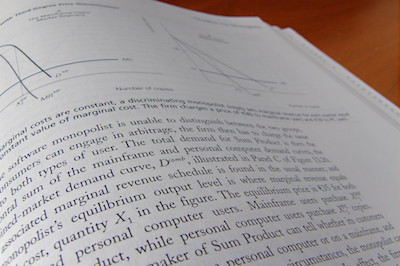
via Flickr User Mark Wainwright
The first rule of economics I ever heard came from the mouth of my father. At the time, I was far too young to understand what he meant when he said, “Son, there’s no such thing as a free lunch”. And then he bought me lunch, which seemed pretty free to me. While this, of course, is a microcosmic and uber-simplified example, it remains true that economics, at its most basic, is a study of relationships (although usually larger in scope than the dynamic between father and son over turkey sandwiches). Economics studies how relationships and lives are sustained by focusing on the allocation of the means that sustain life. This involves a closer look at both the macro and micro-economic forces that influence the performance of economies
Most Economics majors – somewhere in the vicinity of 2/3 – choose to work in the private, for-profit business sector. Economics remains one of the more popular undergraduate majors, although the number of degrees given has fallen slightly as the job outlook has slowed in recent years. However, those that major in Economics leave college with some of the higher-paying potential occupations down the road.
Most career options for Economics students fall within a “good” or “normal” job outlook, with the lower-end salaries falling around $45,000 and the highest above $100,000/year.
The most lucrative opportunities for Economics majors are those that require postgraduate education.
Economics deals with some of the more complex issues that our world has to offer. A large potion of economic work involves extrapolating from complex sets of data to evaluate trends in both macro and microeconomic systems. Our entire world runs on systems of economics, and as a student of the discipline you’ve done quite a bit of legwork (we all shudder remembering those weekly problem sets) to hone your analytical skills. While much of your work as an undergraduate economics major has employed your skills of analysis has been theoretically based in understanding relationships, supply and demand, observing patterns, and extracting meaningful conclusions, your postgraduate work you may well be using the same skills to affect real-life economic relationships. Having analytical skills that are up the task is an indispensible skill to have in the entry-level job market.
In order to efficiently analyze economic data, you’ve likewise honed the ability to think critically in order to do so. In order to fully understand economic systems – and, perhaps more importantly, the issues that they may have – an economics major needs to view these systems with a critical eye. Studying economics isn’t simply a matter of studying the ways in which economic systems work, but also the ways in which they don’t. To see linkages between trends, producers, consumers, and more, economics majors can go on to work in fields such as public policy (link) in order to help shape economic systems for the better. These critical thinking skills help economics majors understand how everyday transactions contribute to greater economic trends, and understand how changes in policy translate to changes in the macro and microeconomic conditions of a given country.
None of this, however, would be possible without the mathematical skills necessary for, and strengthened by, an economics major. The language of economics is largely numerical (run for your lives, English majors). To understand and analyze economic forces, it is absolutely necessary to have a mathematical foundation derived from classes in statistics, calculus, and other advanced-level mathematics courses.
This isn’t to say that economics majors need to not have a competent ability to speak and write as well. Economic analysis must be presented in comprehendible terms, and this involves an ability to speak, write, and in general, relate complex economic data. You’ve had to write analysis, give presentations, explain reports, and it’s entirely possible in the near future, advice clients. To flow effortlessly between the written and spoken word and the mathematical data that supports it is integral to being a successful economics student as well as a successful graduate in the job world.
Finally, the requirements of an economics major has undoubtedly forced you to contend with inputting data into computers to create visual representations of economic trends, as well as write reports. Your familiarity with the software suite employed in your years as an undergraduate economics majors will, I repeat will, be helpful in most any job you find after school.
Economics majors generally break down into two generalized groups in the job market: either business or government. Both will utilize the skills listed above, and many hired economics majors due to the somewhat broad, but also useful sets of skills learned. The fact that economics majors can speak and write, are computer literate, and know how to work with numbers prepares them for many possible entry-level jobs, some of which might include…

via Flickr User Alexander Baxevanis
Accounting
Median Pay: $61,690
Accountants are a sometimes overlooked and yet integral part of a business. Accountants perform such tasks as calculating payroll, keeping track of inventory as it enters and exits the business, and takes charge of managing the assets of a company, whether it be an office building or an office chair. In short, accountants are one of the positions that is behind the scenes but of the utmost importance to the smooth running of an operation. Economics majors, with their efficient working knowledge of numbers and monetary systems are well-equipped for positions in accounting, and it’s a good way to start a career on the way to a more prominent position in business.
Sales
Median Pay: Varies By Industry, from $18,500-$87,000
With a strong understanding of the position of the consumer within a market economy, the relationships between supply, demand, want, and diminishing returns, economics majors are particularly befitting to entry-level sales positions. A sales position can bolster the resume of an economics major by providing face-to-face interactions in which one can synthesize their understanding of economic data and systems with their communication skills.
Market Research and Analysis
Median Pay: $60,660
An economics major can prepare students well for positions in research and analysis. This is a pivotal role, and utilizes many of the skills that you directly applied to your work towards an economics degree. Research analysts help companies to make decisions and set priorities after researching and analyzing data. Here, again, your ability to work with numbers as well as words come in handy. The attention to detail necessary to be a successful economics major is absolutely necessary to being an effective research analyst. But, with the right set of skills and a fast hand at using Excel, economics majors can be quite desirable to companies looking for a well-learned, articulate job-seeker.
The most important thing you can do now as an economics major is start looking and applying for internships. In most cases, a successful career for an economics major is one that involves climbing the ladder. Those at the top do quite well for themselves, but to land such positions, you need to start early making a name for yourself within a large firm. Networking is of the utmost importance as well.
| Financial Analyst, FP&A Coinbase Sacramento, CA | View |
| Economist Bureau of Reclamation Sacramento, CA | View |
| Lead Economist State of California Sacramento, CA | View |
| Digital Content Strategist Davis, CA, Job ID 76894 University of California Agriculture and Natural Resources Davis, CA | View |
| Economist U.S. Department of the Interior Sacramento, CA | View |
| work from home Amazon Davis, CA | View |
| Sr. Financial Underwriting Consultant - Specialty Network Pricing (CBSPN) - Remote UnitedHealth Group Sacramento, CA | View |
| Economist Ecosystems ecosystem_marketplace Sacramento, CA | View |
| Administrative Analyst (City Clerk) City of Sacramento (CA) Sacramento, CA | View |
| Economics Adjunct Assistant Professor Pool Los Rios Community College District Sacramento, CA | View |